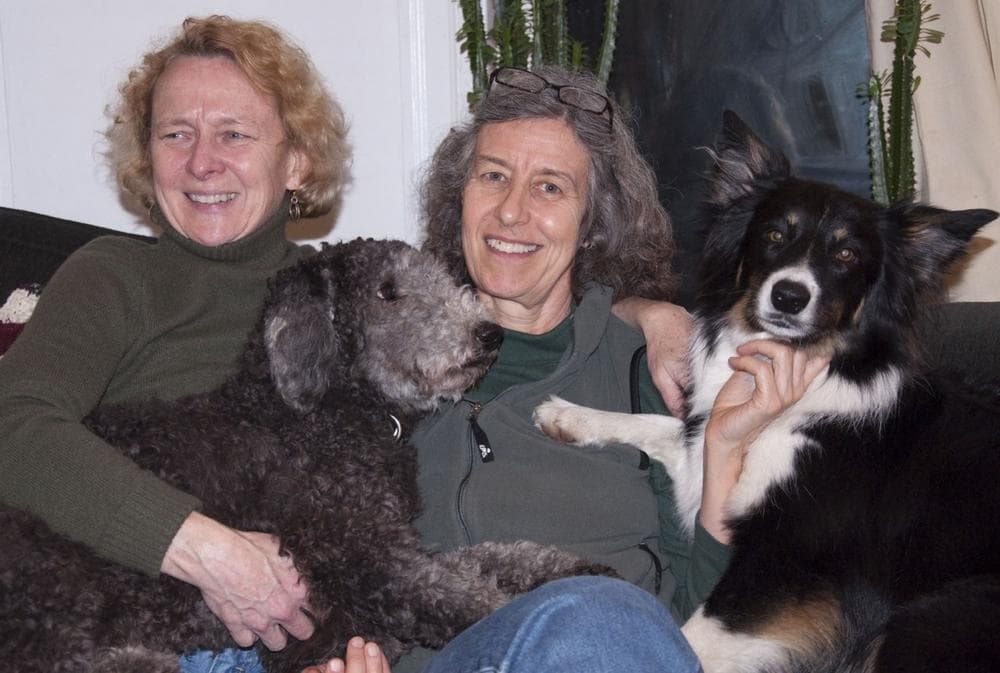Advertisement
Marking The Progress Of Marriage Equality
Denise and I had been together for nine years. We had long known we were in this relationship for the long haul, till death do us part. But we were in love and wanted to do what other couples in love do — get married. We also welcomed the legal recognition for our family — at least in Massachusetts, if not federally — especially as we age.
Denise and I had a small ceremony in our Cambridge backyard that eschewed the trappings of tradition. Our friends and family were intimately involved in the planning and execution, from creating the music and the invitations to designing the ceremony itself, which was officiated by two of our closest friends. Neither Denise nor I believed that we’d feel any different after being married. We were wrong.
Neither Denise nor I believed that we’d feel any different after being married. We were wrong.
There was something transformative about pledging our love and commitment to each other, with the vows we had each written ourselves, before our loved ones. Speaking from my heart to Denise, and having her publicly share her deepest feelings with me, was important and powerful. The love and support we felt that day gave our relationship a new and unexpected layer of meaning and strength.
That’s because marriage matters. It’s a universally understood expression of love, commitment, and the desire to care for the person we love and with whom we want to build a life.
It is inspiring and encouraging to see more and more of America conclude that marriage should be an option for all loving and committed couples. In the past month alone, Rhode Island, Delaware and Minnesota enacted legislation allowing same-sex couples to marry, bringing the total number of marriage equality states to 12 plus the District of Columbia. Illinois may soon follow suit. And these states are building on the momentum of last November’s elections, when voters in Maine, Maryland and Washington affirmed same-sex marriage at the ballot box.

Things have shifted so quickly that it is difficult to remember that just nine years ago this week, on May 17, 2004, Massachusetts became the first state to allow same-sex couples to join the institution of marriage. Even more incredible is that Massachusetts remained the lone marriage equality state for four years, until California joined us briefly, and then Connecticut. Indeed, when GLAD announced in 2008 our “6 x 12 Campaign” to achieve marriage equality throughout New England by the end of 2012, some of our strongest supporters thought we were overreaching. Though Rhode Island’s passage came a few months after the deadline, we’re not complaining about the pace of our progress.
May 17 is a day to celebrate that progress. We must, however, also be cognizant of the backdrop against which this progress continues.
Our Supreme Court is currently considering two cases that could alter the trajectory of the freedom to marry movement. A decision in Windsor v. United States would mean either that married same-sex couples would have their unions recognized by the federal government — ensuring access to critical federal safety nets for their families and conferring the dignity and respect other married couples receive from the U.S. government — or it could mean a continued system of first and second-class marriages in this country for the foreseeable future. Right now Congress is fighting over whether or not to include a provision to allow Americans to sponsor a same-sex spouse or committed partner for U.S. citizenship in an immigration reform bill, despite the fact that LGBT families are literally being torn apart over their inability to do so. A favorable decision in Windsor would render that ideological battle moot.
Advertisement
May 17 is a day to celebrate that progress. We must, however, also be cognizant of the backdrop against which this progress continues.
The Supreme Court’s decision in Hollingsworth v. Perry could mean either the reinstatement of the freedom to marry in California and possibly in other states, or it could mean an unjust repudiation of the relationships of untold numbers of hardworking, taxpaying, loving American families for generations to come.
It is foolish to try to predict how the justices will rule. But regardless of whether the Supreme Court decides to accelerate our country’s journey toward equality for all or take a pass on progress, it’s no longer impossible to imagine the day when same-sex couples can exchange vows in their own backyards or their town hall or their house of worship no matter the state they call home. That’s what matters.
Related:
- Cognoscenti: Wendy Kaminer: The Next Big Battle Over Gay Rights
- Here & Now: Gay Marriage Legal Opinion A Hit At Weddings
- 'Marriage Equality' And The Civil Rights Movement
- Cognoscenti: Eileen McNamara: Rob Portman And How To Get Other GOP Lawmakers To Come Around On Gay Rights
- Gay Marriage And The Evolving Language Of Love
- Shift In Gay Marriage Support Mirrors A Changing America
This program aired on May 15, 2013. The audio for this program is not available.